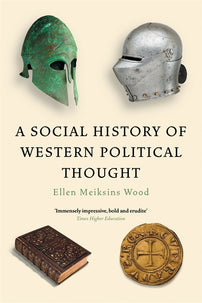A guide to our August titles
Here are the books coming out in August!

In August we're publishing seven exciting new titles - from a previously unpublished collection of Walter Rodney's essays, a radical manifesto for the transformation of post-pandemic politics, to a chilling novel about about one of history’s most reviled figures – all avaiable to pre-order.
Decolonial Marxism is a collection of previously unbound essays written during the world-turning days of Black revolution. In drawing together pages where Walter Rodney elaborates on the nexus of race and class, it offers his reflections on radical pedagogy, outlines programs for newly independent nation-states, considers the challenges of anti-colonial historiography, and produces balance sheets for a dozen wars for national liberation, this volume captures something of the range and power of Rodney’s output. But it also demonstrates the unbending consistency that unites his life and work: the ongoing reinvention of living conception of Marxism, and a respect for the still untapped potential of mass self-rule.
[book-strip index="2" style="buy"]For three decades, until the day he collapsed in the Brazilian surf in 1979, Josef Mengele, the Angel of Death who performed horrific experiments on the prisoners of Auschwitz, floated through South America in linen suits, keeping two steps ahead of Mossad agents, international police and the world’s journalists. In this rigorously researched factual novel—drawn almost entirely from historical documents—Olivier Guez traces Mengele’s footsteps through these years of flight. This chilling novel situates the reader in a literary manhunt on the trail of one of the most elusive and evil figures of the twentieth century.
[book-strip index="3" style="buy"]One of the most important thinkers of his generation, Mimesis is Valery Podoroga's most famous work, a panorama of Russian writing, focusing in on the work of Gogol, Dostoevsky and Bely. He identifies these authors as pioneers in creating an 'other literature'. This constituted a new form of mimesis or vision of the world, in opposition to the Imperial and national myths. Translated into English for the first time, Mimesis develops and elaborates Podoroga's analytic anthropological approach with startling effect, excavating the identities and forms of Russian literature, and society.
[book-strip index="4" style="buy"]The question of ownership is the critical fault line of our times, and during the pandemic this issue has only become more divisive. Since March 2020 we have witnessed the extraordinary growth of asset manager capitalism and the explosive concentration of wealth within the hands of the super-rich. This new oligarchy controls every part of our social and economic lives.
In the face of crisis, the authors warn that mere redistribution within current forms of ownership is not enough; our goal must be to go beyond the limits of the current system, dominated by private enclosure and unequal ownership. Only by reimagining how our economy is owned and by whom can we address the crises of our time—from the fallout of the pandemic to ecological collapse—at their roots.
Today power is in the hands of Wall Street and Silicon Valley. How do we understand this transformation in power? And what can we do about it?
We cannot change anything until we have a better understanding of how power works, who holds it, and why that matters. Through upgrading the concept of hegemony—understanding the importance of passive consent; the complexity of political interests; and the structural force of technology—Jeremy Gilbert and Alex Williams offer us an updated theory of power for the twenty-first century.
In this new edition of Ellen Meiksin Wood's groundbreaking study, incorporating both previous volumes, the book takes us from classical antiquity to the age of enlightenement. In the first volume, Wood traces the development of the Western tradition from classical antiquity through to the Middle Ages in the perspective of social history—a significant departure not only from the standard abstract history of ideas but also from other contextual methods. In the second volume, Wood moves on to explore the formation of the modern state, the rise of capitalism, the Renaissance and Reformation, the scientific revolution and the Age of Enlightenment. In her focus on canonical thinkers through the ages, Wood illuminates a rich and provocative legacy of political ideas unmatched in Western history.
[book-strip index="7" style="buy"]In Confronting Capitalism, Chibber shows that while political organising might be hard, political education doesn’t have to be. Combining elements of Marxism and modern social science with clear language, Chibber elucidates the core dynamics of our economy and politics. His analysis provides an indispensable map of how modern capitalism works and lays out a plan for how socialists can overcome the odds and build a democratic and egalitarian future.






